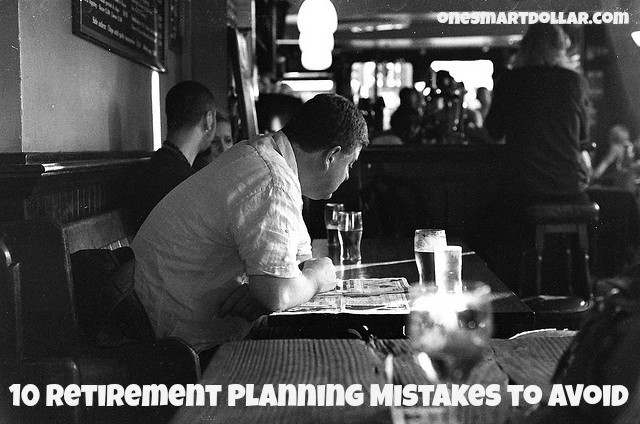
Retirement is the ultimate goal for nearly every person working. However, for many that goal seems so distant and unattainable. The reason is because there are a number of working parts that go into your goals, and most people don’t want to take the time to worry about them. This often leads people to making some retirement planning mistakes; mistakes that cost them thousands of dollars and take years to remedy. Here are the top 10 retirement planning mistakes, and how to avoid them.
Failure to Plan
I debated where to put this, but ultimately it comes first. If you don’t plan for retirement, there is no way to get there other than sheer luck. The good news is that developing a plan is incredibly simple. Most financial advisors will help you build a plan for free. The way they get paid is you buy your insurances and investments through them.
Relying on Social Security
This is not to say Social Security is going away. It’s not even to say that it won’t pay out much. It is to say that Social Security was never meant to be your sole source of retirement income, but rather as a starting point. You need additional investments and savings (like a 401k, IRA, Roth IRA, or non-qualified accounts) to meet your goals.
Believing your Expenses will Decrease
Somewhere along the line a financial advisor claimed that you will only spend about 60% of your current income during retirement. For some that is true. For most your living expenses are going to be the same as they were before retirement (with the one exception that you won’t need to save for retirement any longer). Play it safe and assume you will need the same amount of money during retirement as you need before retirement.
Paying Off Debt Instead of Saving
Nobody likes debt, and it can seem like a huge hurdle that is preventing you from saving for retirement. Too many people believe they need to wipe out their debt before they save money. The fact is you have to do both, and unless you have a high interest rate on your debt (6% or more) then you should probably just pay the minimums and invest anything extra. Every situation is different, so you’ll have to crunch your own numbers.
Missing the Match
Most employers will offer a retirement plan through work. Most employers offer a match for contributions. If you aren’t putting in enough to at least get the maximum match, then you’re losing money. Don’t think you can afford it? Look at it this way: if you make $50,000 per year, you take home about $3,125 per month. By putting aside 3% you still take home $3,031 per month. $94 less in your paycheck but your investment account grows by $250.
Relying Solely on Your Income
There are many jobs out there that pay quite well. However, there are many more that don’t pay enough to meet your entire needs. So you need to pick up some work on the side, freelance, or start your side hustle. Working on the side could easily bring you an extra $500 per month without too much effort. Invest all of that and 20 years later you have an additional $300,000 in your retirement account.
Planning to die too Soon
Retirement planning is based on your best guess. You know when you’d like to retire, and you know about when you will die. However, people are living longer now than they ever have; how much more so in the next 20, 30, or 40 years? If you reach retirement age, you have a 50/50 chance of living past 90 years old. Plan to live to 100 so you don’t cut yourself short at the end of your life.
Unrealistic Retirement Dates
People are living longer than ever, yet people still think they can retire at age 45. Unless you have a high paying job and you keep your expenses to just a few hundred dollars per month, don’t count on it. Likewise don’t fool yourself and say you’ll never retire. Keep those dates realistic and err on the side of caution.
Being Too Conservative
Most people are risk averse. But being too cautious, especially when you are young, is terrible for your long-term goals. Take a healthy amount of risk while you have time to recover, and reduce that risk as your approach retirement.
Wasting Money on Planner Fees
Hiring a fee based financial planner can be a good idea. However, it is not for everyone, and in fact many people will be better suited going with a planner that is paid on commission. Did you know if you pay a financial planner 1% annually, after 30 years your retirement account will be 20% less than if you managed it yourself (all rates of return being equal)?
Retirement planning isn’t too hard, but there are things that you have to be aware of. Take the time to develop a plan and stick to the plan so you can retire happy and healthy. Avoid these 10 mistakes and you are well on your way to maximizing your golden years.
